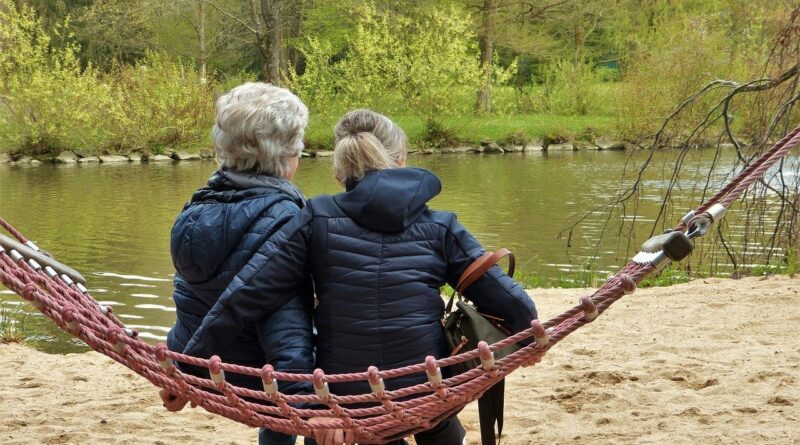When a Parent Dies: I Lost My Mom
I lost my Mom recently, fortunately not to Covid-19, and was able to be with her until she passed. I can only imagine what those who have not been able to be with their loved ones must be suffering. I am going through a rough time right now but am hanging in there and am living one day at a time. I needed help and have been reading many books and joining help groups. If you are going through the loss of a parent like me, perhaps what I’ve learned during these months can help you. It has helped me understand that I am not crazy and that what I’m going through and how I feel right now is normal.
When a parent of an adult dies, there is almost an unspoken expectation that it will not hit you head on. An adult is expected to accept death as a part of life, to handle all sudden losses in an appropriate adult manner. But really, what does that mean? That you should not be sad? That you should be so grateful they didn’t die when you were a child that you don’t need to mourn your parent? But all this is just an under-estimation of grief.
Grief is the reflection of the connection that has been lost. That loss does not diminish because you are an adult or because your mother or father lived a long life. Our society places enormous pressure on us to get over loss, to get through the grief. But how long do you grieve for the man who was your father for 30 years? Do you grieve less for your mother of 50 years? The loss happens in a moment, but its aftermath lasts a lifetime. The grief is real because loss is real. Each loss has its own imprint, as distinctive and unique as the person we lost. It doesn’t matter how old we are.
When we lose an aged parent, many times well-intentioned friends try to offer condolences, such as, “He had a long life, you must be happy about that,” or, “You’re so lucky he died so quickly.” However, these words often do not resonate as we suffer the loss of a father or mother who had been by our side our entire life. We will never have another father. We will never have another mother.
Our parents are often our main connection in the world and to the world. Even if we have a loving spouse, children and many close friends, the death of a parent means the loss of one of our first and most important connections. The misconception that a mature and capable adult will not need to grieve their parent can cause the bereaved to feel even more alone, as their grief goes unrecognized.
REFLECTION
After our parents die, we take another look at them. We realize, perhaps for the first time, all they did for us as children. For some of us, when we become parents, we appreciate the challenges our own parents must have gone through. We gain a new perspective on their lives.
In our adulthood, our relationship with our parents changes and continues. Before a parent is gone, we understand intellectually that they will die someday. But understanding and anticipating does not prepare us for the grief we feel when as an adult we lose a parent. As you reflect on the memory of your loved one, whether you are alone or walking through it with a surviving parent, you are beginning the journey through the now well-known stages of grief.
5 Stages of grief
The emotions of grief reflect feelings and are beyond organizing. They are organic responses to loss, and just like there are no typical losses, there are no typical responses to loss. The truth is that our grief is as individual as our lives.
The 5 stages of grief—denial, anger, bargaining, depression and acceptance—are a part of the framework that makes up our learning to live with the one we lost. They are tools to help us frame and identify what we may be feeling; but not to organize it. They are not stops on some linear timeline of grief. Not everyone goes through all of them, and there is no prescribed order.
1. Denial
What happens during the denial stage?
- Denial and shock help us to cope and make survival possible.
- Denial helps us to pace our feelings of grief.
- There is a grace in denial. It is nature’s way of letting in only as much as we can handle.
What does denial look like?
- Denial is a disbelief that your parent isn’t ever going to call again or that your father isn’t just a flight away.
- You can’t make sense that he will never walk through your door again.
- At the beginning, we might be paralyzed with shock.
- Rather than denying the actual death when someone says, “I can’t believe he’s dead,” the person is actually communicating that this death is too much for his or her psyche.
- You begin to question the how and why. You may ask as you review the circumstances, how did this happen?
- You are no longer in an external story telling mode. Now you turn inward as you begin the search for understanding.
- You explore the circumstances surrounding the loss. Did it have to happen? Did it have to happen that way? Could anything have prevented it?
The finality of the loss begins to gradually sink in. She is not coming back. This time he didn’t make it. With each realization of the truth, you begin to climb the mountain of realizing they are really gone. As you accept the reality of the loss and start to ask yourself questions, you are unknowingly beginning the healing process. You will find yourself becoming stronger while the denial is beginning to fade. But as you proceed, all the feelings you were denying begin to surface.
2. Anger
Anger is a necessary stage of the healing process. Be willing to feel your anger. The more you truly feel it, the more it will begin to dissipate and the faster you will heal. We choose to feel anger often to avoid the feelings underneath, until we are ready to face them.
Anger does not have to be logical or valid. It is important to feel the anger without judging it, without attempting to find meaning in it. Life is unfair. Death is unfair. Anger is a natural reaction to the unfairness of loss. If you could change things, you would, but you can’t and you are not to blame.
What happens during the anger stage?
- Anger often masks our pain, allowing time for intense feelings to come to the surface—feelings that may be too much to handle right now.
- Anger means you are progressing through your grief.
- Anger affirms that you can feel, that you did love and that you have lost.
- Unfortunately, anger can isolate you from friends and family at the precise time you may need them the most.
What does anger look like?
- Anger at your parent that he didn’t take better care of himself.
- Or anger that you didn’t take better care of him.
- You may be angry that you didn’t see this coming and when you did, nothing could stop it.
- Or you may be angry with the doctors for not being able to save someone so dear to you.
- Your anger may take the form of facing the fact that bad things could happen to someone who meant so much to you.
- Anger at the healthcare system, at life or at your parent for dying.
- Anger coupled with blame and resentment.
- You also may experience feelings of guilt, which is anger turned inward on yourself.
3. Bargaining
What happens during the bargaining stage?
- Bargaining can help our mind move from one state of loss to another.
- It can be a way-station that gives our psyche the time it may need to adjust.
- Bargaining can fill the gaps that our strong emotions generally dominate as it keeps suffering at a distance.
- It allows us to believe that we can restore order to the chaos that has taken over.
What does bargaining look like?
- “Please God,” you bargain, “I will never be angry at my mom again if you’ll just let her live.”
- “What if I devote the rest of my life to helping others? Then, can I wake up and realize this has all been a bad dream?”
- “If only we had found the tumor sooner and recognized the illness more quickly.”
- “What if we could have stopped the accident from happening?”
- After a death, bargaining often moves from the past to the future.We may bargain that we will see our parents again in heaven.
- We may bargain and ask for a respite from illnesses in our family, or that no other tragedies visit our loved ones.
As we move through the bargaining process, the mind alters past events while exploring all those “what if” and “if only” statements. Sadly, as adults, we arrive at the inevitable conclusion…the reality is that parent is truly gone.
4. Depression
After bargaining, our attention moves into the present. Empty feelings surface, and grief enters our lives on a deeper level, deeper than we ever imagined. This depressive stage feels as though it will last forever. It’s important to understand that this depression is not a sign of mental illness. It is the appropriate response to the loss of a parent.
Depression is an appropriate response
Depression after a loss is often criticized as unnatural: a state to be fixed, something to snap out of. The loss of a parent is a very depressing situation, and depression is a normal and appropriate response. When a loss fully settles in your soul, the realization that your parent didn’t get better this time and is not coming back is understandably depressing.
Depression is a step toward healing
If we look at grief as a process of healing, then depression is one of the many necessary steps along the way. If you have the awareness to recognize you are in depression or have been told by multiple friends you are depressed, your first response may be to resist and find a way out. Finding a way out of depression feels like going into a maze, fearful that there is no exit.
How to deal with depression
As tough as it is, depression can be dealt with in a paradoxical way. See it as a visitor, perhaps an unwelcome one, but one who is visiting whether you like it or not. Make a place for your guest. Invite your depression to pull up a chair with you in front of the fire, and sit with it, without looking for a way to escape.
Allow the sadness and emptiness to cleanse you and help you explore your loss in its entirety. When you allow yourself to experience depression, it will usually leave as soon as it has served its purpose in your loss. As you grow stronger, it may return from time to time, but that is how grief works.
What happens during the depression stage?
As difficult as it is to endure, depression has elements that can be helpful in grief.
- It slows us down and allows us to take real stock of the loss.
- It makes us rebuild ourselves from the ground up.
- It clears the deck for growth.
- It takes us to a deeper place in our soul that we would not normally explore.
5. Acceptance
This stage is about accepting the reality that our loved one is physically gone and that this new reality is permanent. We will never like this reality or make it okay, but eventually we accept it. This is where our final healing and adjustment can take a firm hold, despite the fact that healing often looks and feels like an unattainable state.
What happens during the acceptance stage?
- We, the survivors, begin sadly to realize that it was our loved one’s time to die.
Of course it was too soon for us, and probably too soon for him or her, too. Perhaps he was very old or full of pain and disease. Perhaps her body was worn down and she was ready for her life to be over. But our life still continues. It is not yet time for us to die. In fact, it is time for us to heal.
- We often come to terms with our own mortality.
- We learn to live with the death and begin to live within the new norm.
What does acceptance and healing look like?
- Remembering, recollecting and reorganizing.
- We may cease to be angry with God; we may become aware of the common-sense reasons for our loss, even if we never actually understand the reasons.
Now we try to live in a world where our parent is missing. In resisting this new norm, at first many people want to maintain life as it was before a loved one died. In time, through bits and pieces of acceptance, we see that we cannot maintain the past intact. It has been forever changed and we must readjust.
In our grief, while heavy emotions flow within us, we are still called upon to complete the practical obligations of tying up the loose ends of our parent’s world. One of the tasks laid before us in our grief is taking care of our parent’s possessions. Whatever their possessions may be, whether the most valuable items or small inexpensive things they collected over the years, they all are symbolic. They represent things that meant enough to our parents that they chose to keep them. People often find this an overwhelming task.
Taking care of your parent’s possessions
- Consider inviting a friend to help.
- Use this as a journey of discovery to reveal memories that were long forgotten by you.
- You can also use this difficult process to learn new things about your parents.
- You may feel like you are invading their privacy but just remember—who else would they want to do this besides you? Who would protect their privacy and their dignity better than you?
- Have a camera with you. Items that you want to remember but will never use again can be remembered with a picture and given to someone who can use it.
Letting go of items
It may be hard to let go of certain things that represent your parents to you. Other items you may want to keep to give to friends, family members, or perhaps to your kids. Keep some of them and give the rest away to a charity of your choice. This can be your parents’ final gift to the world. Imagine how these things could help someone else who does not have the money or resources to buy everything they need. Now, someone else can get pleasure from and find usefulness for some of your parent’s prized possessions.
Life without Mom or Dad in the world
Whether our parents live near or far, are emotionally close or distant, they ground us in the world. They have been there since the moment we were born and even though, intellectually, we know they will die some day, how do we imagine something that has always been there, suddenly being gone?
The death of a parent delivers us to a world we have thought about but couldn’t actually fully prepare for. We are suddenly exploring new terrain, feeling rootless or as if the ground has been pulled out from under us.
A new relationship
As we heal, we learn who we are and who our parents were in life. In a strange way, as we move through grief, healing brings us closer to the person we loved. A new relationship begins. We learn to live with the parent we lost.
Now that you come to the end of a life, that same life which gave you life, the memory is buried deep in your heart and dwells deep in your soul. A new relationship will continue with that parent—not a physical relationship but one where the parent lives on in your heart. You will continue to remember them, think of them and love them, for the rest of your life until you meet again.
Little by little, we withdraw our energy from the loss and begin to invest it back into life. We put the loss into perspective, learning how to remember our loved ones and commemorate the loss. In the days to come, as time passes, it may still hurt but in time it will hurt less frequently. All that your parent was, all the love you shared and the relationship you had will not die. That depth of love, that depth of caring, is everlasting. We can never replace our parents, but we can strengthen our family connections as we find new and deeper meaning in our existing relationships. We begin to live again, but we cannot do so until we have given grief its time.
Original article published by Dignity Memorial









![Tony Robbins’s Top 10 Rules For Success [VIDEO]](https://www.forevernaturalwellness.com/wp-content/uploads/2016/03/success-coffee-973903_1280-150x150.jpg)


